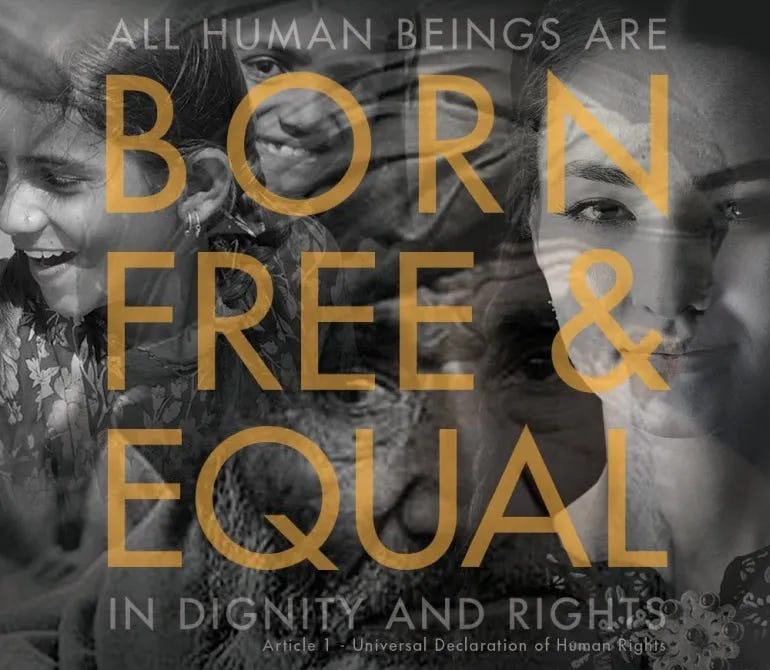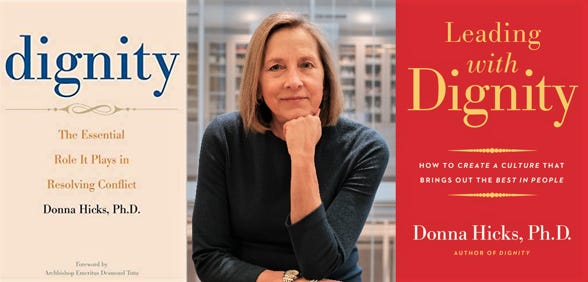Dignity, Not DEI Or Pluralism: The Deeper Principle We Must Lead With
An article in The New Yorker, by Emma Green on April 14th was titled, “What Comes After D.E.I.?” Apparently, “Colleges around the country, in the face of legal and political backlash to their diversity programs, are pivoting to an alternative framework known as pluralism.”
In the ongoing conversation around Diversity, Equity, and Inclusion (DEI), pluralism has often been upheld as a defining value of democratic and multicultural societies. The notion that different people — from various backgrounds, beliefs, and identities — can live together peacefully and respectfully has underpinned decades of liberal social policy and organizational strategy.
In a world increasingly marked by polarization, performative inclusion, and DEI fatigue, pluralism may not be enough. We need a deeper, more universally grounded principle to guide how we relate to one another — one that transcends mere tolerance of difference and instead affirms a shared human truth. That principle is dignity.
Dignity is not a rhetorical flourish or vague moral sentiment. It is a globally enshrined, rights-based foundation — recognized in the first line of the Universal Declaration of Human Rights (UDHR), adopted by the United Nations in 1948: “All human beings are born free and equal in dignity and rights.”
The fact that nearly every country on Earth has ratified the declaration makes dignity not only aspirational, but actionable. It is a legally and morally defensible claim. Any person, anywhere, can rightfully say: My dignity is not a favour or a social courtesy — it is my right. And that makes dignity radically powerful.
Beyond Difference: What Pluralism Misses
Pluralism is often framed as a triumph of modern liberal societies. It emphasizes coexistence — the capacity to recognize and respect diversity in its many forms. But this emphasis on difference, while important, can be limiting. Pluralism is primarily concerned with how we manage our differences; dignity asks us to consider what binds us despite them.
Where pluralism says, “Let us tolerate and accommodate,” dignity says, “You matter — not because of your identity, but because of your humanity.”
Pluralism, especially in institutional DEI frameworks, can devolve into a kind of surface-level performance. The presence of diverse identities is celebrated, yet individuals still report feeling excluded, disrespected, or dehumanized in the environments meant to include them. In contrast…..
Dignity goes to the root: it demands that systems, cultures, and practices treat each person as inherently worthy — not because of their utility, uniqueness, or statistical value, but because their worth is innate and non-negotiable.
The Universal Basis for a New Ethic
The power of dignity lies not only in its moral force but in its legal and political weight.
Unlike pluralism — which is not enshrined in international law or universally agreed upon — dignity is.
The UDHR is not a Western document. It was shaped by global voices and adopted by consensus in the wake of a world war that revealed the catastrophic consequences of treating some lives as less worthy than others. Since then, nearly every nation-state has signed on to its principles, and many have incorporated the concept of dignity into their constitutions, legal codes, and educational systems.
This makes dignity a rare gem in international discourse: a concept that is both shared and binding.
In practical terms, dignity offers a common moral and legal language for advocacy. It allows citizens, organizations, and governments alike to demand better — not from a place of ideology, but from a position of recognised right. It elevates DEI from a matter of preference or branding to a question of justice.
In a time when democratic values are increasingly challenged, and institutions struggle to hold moral ground, this universality is no small thing. It makes dignity hard to argue against — and even harder to ignore.
DEI Through the Lens of Dignity
DEI efforts, though well-intentioned, often suffer from fragmentation. Diversity initiatives can focus on demographic representation while missing systemic inequality. Equity is sometimes reduced to resource redistribution without addressing the roots of power imbalances. Inclusion may center on creating space for voices, but not necessarily on ensuring those voices are heard or respected.
Dignity reframes all of these efforts under a single, coherent moral imperative: to uphold the full humanity of every person.
Dignity is holistic — it encompasses psychological safety, physical wellbeing, freedom from humiliation, respect for autonomy, and access to justice. It invites not just representation but recognition; not just inclusion but belonging.
Importantly, it is also measurable. Studies in healthcare, education, and organizational psychology increasingly use dignity as a framework to assess outcomes like perceived fairness, respect, trust, and participation. Institutions that prioritize dignity report not only greater equity but also higher engagement, wellbeing, and long-term sustainability.
Dignity Is Not Just a Value — It’s a Demand
In policy, law, and culture, dignity provides a foundation upon which robust, rights-based governance can be built. It clarifies obligations: institutions are not merely encouraged to honour dignity — they are required to.
It also clarifies accountability. When dignity is violated — through degrading treatment, dehumanizing language, or exclusionary systems — the response is not simply a social critique; it can be a legal or ethical claim.
Dignity is so hard to refute. While pluralism can be resisted in the name of cultural homogeneity, nationalism, or traditional values, dignity resists such relativism. It speaks in the language of rights, not preferences.
This makes it especially powerful in authoritarian or repressive contexts, where appeals to pluralism may falter. One can always argue against the need for diversity; it is far more difficult to argue against the inherent worth of the human person.
A More Human Future
In the end, we need pluralism — but we need dignity even more. Pluralism ensures that people can live together in peace. Dignity ensures that each of them is truly seen, valued, and protected.
If we want our societies and institutions to be not only inclusive but just; not only diverse but humane — we must build them on the deeper ground of dignity.
This is not idealism. It is a return to the moral clarity the world declared in 1948 — and which remains just as urgent today.
In times of complexity, division, and change, dignity gives us something pluralism cannot: a universal, rights-based foundation for action. It tells us: You matter. I matter. We all matter — not because of what we believe, or where we come from, or how we identify, but because we are human. That is the better way. And it’s already ours to claim.
OUR WORK ON DIGNITY
As Founder and CEO of the demy I have worked with Dr Donna Hicks, Author of Dignity and Leading with Dignity for some time. We developed an Executive Education Programme with her on Leading with Dignity and hope to re-run that again later this year.
You can also see my past interview with Donna for the Salon:
We also ran a live session with Donna which was recorded:





